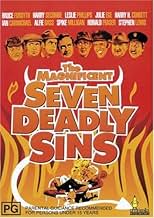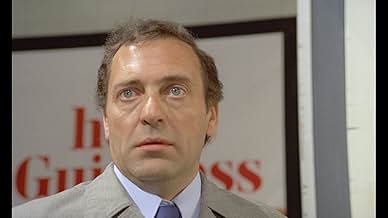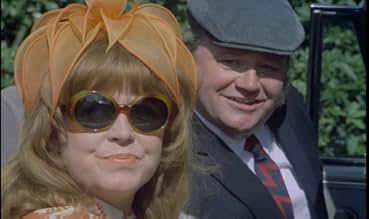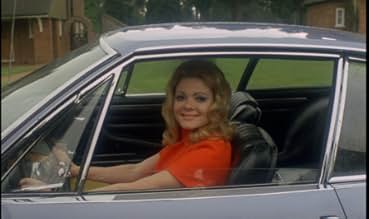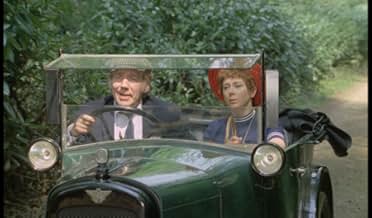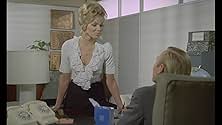Die herrlichen sieben Todsünden
Originaltitel: The Magnificent Seven Deadly Sins
IMDb-BEWERTUNG
5,3/10
529
IHRE BEWERTUNG
Füge eine Handlung in deiner Sprache hinzuThis early Seventies British comedy takes us through seven short stories based on the Seven Deadly Sins. This film is a montage of different styles, from Spike Milligan's mainly silent "Slot... Alles lesenThis early Seventies British comedy takes us through seven short stories based on the Seven Deadly Sins. This film is a montage of different styles, from Spike Milligan's mainly silent "Sloth", to the leering Harry H Corbett in "Lust".This early Seventies British comedy takes us through seven short stories based on the Seven Deadly Sins. This film is a montage of different styles, from Spike Milligan's mainly silent "Sloth", to the leering Harry H Corbett in "Lust".
Suzanne Heath
- Chloe (segment "Avarice")
- (as Susanne Heath)
Rosemarie Reede
- Woman (segment "Gluttony")
- (as Rosemarie Reed)
Empfohlene Bewertungen
Don't give up on this one after the first story or two. Wait for the segment featuring Harry H. Corbett (it's a mini-classic).
As for the rest of the episodes in the film - very hit and miss. Strangely enough, I did not find the Spike Milligan silent 'Sloth' episode funny at all. The sections with Leslie Philips and Ian Carmichael/Alfie Bass were slightly above average.
Not a complete waste of time, with one jewel amongst the rough.
Need to type three more lines of text before this capsule review will get to be submitted as at this present moment IMDb will only accept 10 lines of text minimum. Time for a change. Make it 6 or 7.
As for the rest of the episodes in the film - very hit and miss. Strangely enough, I did not find the Spike Milligan silent 'Sloth' episode funny at all. The sections with Leslie Philips and Ian Carmichael/Alfie Bass were slightly above average.
Not a complete waste of time, with one jewel amongst the rough.
Need to type three more lines of text before this capsule review will get to be submitted as at this present moment IMDb will only accept 10 lines of text minimum. Time for a change. Make it 6 or 7.
Written by and starring a veritable who's who of '70s British comedy, one might reasonably expect The Magnificent Seven Deadly Sins to be a laugh riot from start to finish; nothing could be further from the truth. Of the seven skits on offer, five are embarrassingly unfunny and one is downright depressing. Only an absurd black-and-white spoof of silent movies succeeds in tickling the ribs, with plenty of walnut-based humour.
Being a product of the '70s, the film is unashamedly un-PC, with dolly birds in hot-pants aplenty, innuendo, and even a moment involving blackface (which is funny for all the wrong reasons). Things kick off with a tasty blonde bit of crumpet stripping off for the camera, supposedly because the girl is a friend of the director (who is presented as a horribly dated cartoon character courtesy of animator Bob Godfrey, best known for cartoon dog and cat, Roobarb and Custard). The animated film-maker then introduces the first of the seven stories...
Avarice stars TV gameshow legend Bruce Forsyth as chauffeur for a greedy businessman who demands that his driver retrieve a 50p coin that has fallen down a drain. Much of the humour is derived from Forsyth falling over in the sewer, which gives some idea of the level of sophistication at play. Didn't he do well? Well, no, actually.
The second story is even worse. Envy sees Harry Secombe as a henpecked husband ordered by his wife to buy her dream home (owned by Geoffrey Bayldon and June Whitfield), whatever it takes. The 'hilarity' includes Secombe having not one, but two, buckets of water thrown over him - it's that clever!
Up next is Gluttony, written by Barry Cryer and Graham Chapman, and starring Leslie 'Ding dong!' Phlllips as an advertising executive promoting a slimming biscuit, but who cannot help but tuck into junk food whenever he can. This is tedious stuff, only worth watching for sexy Julie Ege as vice president of the biscuit company, who, for some strange reason, has the hots for Phillips.
Number four is Lust: Harry H. Corbett plays a 38-year-old single man desperate to pull himself a bird. Rather than go to a club or pub, he hangs around a tube station and eyes up the talent, eventually settling for a girl who has been stood up by her date. While she is in a phone booth, wondering what to do, Harry pops into the next booth and rings her, chatting her up and asking if she would like to meet up. What happens next is not only not funny, but actually rather heart-rending. Corbett puts in a solid performance, but a side-splitter this is not.
Pride features Ian Carmichael and Alfie Bass as two stubborn drivers who meet halfway down a narrow country lane. With neither man willing to back up, the scene is set for laughs galore, but none arrive. What do arrive are an AA man and an RAC man, who add to the confusion, until a bobby turns up to settle the argument. Written by Galton and Simpson (Hancock's Half Hour, Steptoe and Son), but with little of their magic in evidence.
The sixth chapter is the best. A silent movie (complete with caption cards) written by and starring Spike Milligan, Sloth is sublime lunacy, featuring a cast of characters who will do anything to save themselves from effort, from a man who would rather wait for a tree to fall than walk around it, to Ronnie Barker sat down at a bus queue, asking the woman in front to help him open his walnut. This is nutty nonsense in more ways than one, and extremely funny.
It's a return to dreadful form for the final story, Wrath. Two old men on a park bench decide that they've had enough of the grouchy park keeper (played by Stephen Lewis, Blakey from On The Buses) and plot to kill him. Like a live-action Roadrunner/Wile. E. Coyote cartoon, none of their schemes go as planned, the pair eventually blowing themselves up in a public convenience (along with the park keeper, who continues to torment them in hell). It's a chuckle-free way to end what is a mostly disappointing movie, especially considering the talent involved.
Being a product of the '70s, the film is unashamedly un-PC, with dolly birds in hot-pants aplenty, innuendo, and even a moment involving blackface (which is funny for all the wrong reasons). Things kick off with a tasty blonde bit of crumpet stripping off for the camera, supposedly because the girl is a friend of the director (who is presented as a horribly dated cartoon character courtesy of animator Bob Godfrey, best known for cartoon dog and cat, Roobarb and Custard). The animated film-maker then introduces the first of the seven stories...
Avarice stars TV gameshow legend Bruce Forsyth as chauffeur for a greedy businessman who demands that his driver retrieve a 50p coin that has fallen down a drain. Much of the humour is derived from Forsyth falling over in the sewer, which gives some idea of the level of sophistication at play. Didn't he do well? Well, no, actually.
The second story is even worse. Envy sees Harry Secombe as a henpecked husband ordered by his wife to buy her dream home (owned by Geoffrey Bayldon and June Whitfield), whatever it takes. The 'hilarity' includes Secombe having not one, but two, buckets of water thrown over him - it's that clever!
Up next is Gluttony, written by Barry Cryer and Graham Chapman, and starring Leslie 'Ding dong!' Phlllips as an advertising executive promoting a slimming biscuit, but who cannot help but tuck into junk food whenever he can. This is tedious stuff, only worth watching for sexy Julie Ege as vice president of the biscuit company, who, for some strange reason, has the hots for Phillips.
Number four is Lust: Harry H. Corbett plays a 38-year-old single man desperate to pull himself a bird. Rather than go to a club or pub, he hangs around a tube station and eyes up the talent, eventually settling for a girl who has been stood up by her date. While she is in a phone booth, wondering what to do, Harry pops into the next booth and rings her, chatting her up and asking if she would like to meet up. What happens next is not only not funny, but actually rather heart-rending. Corbett puts in a solid performance, but a side-splitter this is not.
Pride features Ian Carmichael and Alfie Bass as two stubborn drivers who meet halfway down a narrow country lane. With neither man willing to back up, the scene is set for laughs galore, but none arrive. What do arrive are an AA man and an RAC man, who add to the confusion, until a bobby turns up to settle the argument. Written by Galton and Simpson (Hancock's Half Hour, Steptoe and Son), but with little of their magic in evidence.
The sixth chapter is the best. A silent movie (complete with caption cards) written by and starring Spike Milligan, Sloth is sublime lunacy, featuring a cast of characters who will do anything to save themselves from effort, from a man who would rather wait for a tree to fall than walk around it, to Ronnie Barker sat down at a bus queue, asking the woman in front to help him open his walnut. This is nutty nonsense in more ways than one, and extremely funny.
It's a return to dreadful form for the final story, Wrath. Two old men on a park bench decide that they've had enough of the grouchy park keeper (played by Stephen Lewis, Blakey from On The Buses) and plot to kill him. Like a live-action Roadrunner/Wile. E. Coyote cartoon, none of their schemes go as planned, the pair eventually blowing themselves up in a public convenience (along with the park keeper, who continues to torment them in hell). It's a chuckle-free way to end what is a mostly disappointing movie, especially considering the talent involved.
I first saw this film as a child, and it's stayed with me all these years - with its certain familiarity and a hankering for times gone by, when comedy was a lot more unsophisticated and didn't always require a great deal of intellectual engagement.
Viewing it now, all these decades later, its many flaws are apparent - and it must take a fair bit of dedication for anyone to want to sit through it!
As the title suggests, the film revolves around each of the seven deadly sins, with an individual segment for each one of around 15 mins. These are written and directed by different people, and have a different cast each time.
One bonus of this is the huge and familIar cast of the great and good of British comedy from this period in the early 70s - though perhaps not many would be recognizable outside these shores.
The comedy, such as it is though, is laboured, cheesy and sadly nearly always misses the mark.
The first two segments (starring Bruce Forsyth and Harry Secombe) are strangely compelling - despite their absurdities and daft endings.
Things take a dip though with a muddled third segment - starring the reliable Leslie Phillips in a role typically suited to his caddish and lecherous on-screen image, and surely written with him in mind.
Harry H Corbett stars in the fourth segment - it's one of the better stories here (set mostly on a tube train and tube station), but suffers from a decidedly corny ending - one that's also a bit sad too.
The fifth segment, starring Ian Carmichael and Alfie Bass is probably the best of this weak bunch. It studies class differences, and how this is tackled when a wealthy man in a Rolls-Royce meets a more humble man in a battered old jalopy head-on in a narrow country lane, with neither party willing to swallow their pride and back up to let the other car go.
After this highlight though, things fall apart with the final two segments. The first is a silent comedy starring Spike Milligan (among others) and feels very forced. It fails to raise any laughs, or even anything in the way of entertainment - and the bar hadn't exactly been set very high.
The final segment is a ludicrous story of two men who want to murder the oppressive local park keeper (played by 'On the Buses' Stephen Lewis), and this sorry and laughter-free story can't end soon enough...
All in all then, a real hotch-potch of poor comedy, and one that does its many stars a great disservice.
I guess it's worth watching these days just for its oddity value - like 'it's so bad it's good' kind of thing.
My favorite part was spotting the locations in and around Pinewood Studios, and also spotting all the many famous faces, some in quite minor or supporting roles too.
View at your peril, but be warned - 'Carry On' this is not!
Viewing it now, all these decades later, its many flaws are apparent - and it must take a fair bit of dedication for anyone to want to sit through it!
As the title suggests, the film revolves around each of the seven deadly sins, with an individual segment for each one of around 15 mins. These are written and directed by different people, and have a different cast each time.
One bonus of this is the huge and familIar cast of the great and good of British comedy from this period in the early 70s - though perhaps not many would be recognizable outside these shores.
The comedy, such as it is though, is laboured, cheesy and sadly nearly always misses the mark.
The first two segments (starring Bruce Forsyth and Harry Secombe) are strangely compelling - despite their absurdities and daft endings.
Things take a dip though with a muddled third segment - starring the reliable Leslie Phillips in a role typically suited to his caddish and lecherous on-screen image, and surely written with him in mind.
Harry H Corbett stars in the fourth segment - it's one of the better stories here (set mostly on a tube train and tube station), but suffers from a decidedly corny ending - one that's also a bit sad too.
The fifth segment, starring Ian Carmichael and Alfie Bass is probably the best of this weak bunch. It studies class differences, and how this is tackled when a wealthy man in a Rolls-Royce meets a more humble man in a battered old jalopy head-on in a narrow country lane, with neither party willing to swallow their pride and back up to let the other car go.
After this highlight though, things fall apart with the final two segments. The first is a silent comedy starring Spike Milligan (among others) and feels very forced. It fails to raise any laughs, or even anything in the way of entertainment - and the bar hadn't exactly been set very high.
The final segment is a ludicrous story of two men who want to murder the oppressive local park keeper (played by 'On the Buses' Stephen Lewis), and this sorry and laughter-free story can't end soon enough...
All in all then, a real hotch-potch of poor comedy, and one that does its many stars a great disservice.
I guess it's worth watching these days just for its oddity value - like 'it's so bad it's good' kind of thing.
My favorite part was spotting the locations in and around Pinewood Studios, and also spotting all the many famous faces, some in quite minor or supporting roles too.
View at your peril, but be warned - 'Carry On' this is not!
Mostly pretty bland comedy, desperately contrived around its concept with an air quaint British naughtiness to keep it afloat.
I have a low key appreciation for "Pride" and "Gluttony" is sort of ribald good fun; it's fapable at the very least.
Unsurprisingly it's "Lust" that stands out among the crowd but not because it's funny or sexy. It's a disarmingly haunting depiction of loneliness and desperation.
I have a low key appreciation for "Pride" and "Gluttony" is sort of ribald good fun; it's fapable at the very least.
Unsurprisingly it's "Lust" that stands out among the crowd but not because it's funny or sexy. It's a disarmingly haunting depiction of loneliness and desperation.
Never riotously funny, there's nevertheless a consistent strain of silliness throughout the movie that's reliably entertaining. Some of the humor toes a line in regards to racism, sexism, fat jokes, or other topics broached in an unnecessarily careless manner - though we also see these turned on their heads in mockery, after a fashion. And much more than that, the comedy is built on steadfast staples of sex jokes and innuendo, sight gags, exaggerated characters and situations, a touch of physical comedy, and an abundance of abject ridiculousness. Even with such a large cast through each of the segments (with some very recognizable names and faces), and so many writers contributing to the project, the feature still feels tight and sharp, with solid timing and a keen precision in the orchestration of every scene. My commendations to filmmaker Graham Stark and all others who worked on 'The magnificent seven deadly sins' - this is a good bit of fun!
From one to the next some segments may be more more engaging and enjoyable than others, with snappier acting, punchlines, and/or writing at large. It's also worth noting that some jokes are built on small facets of British culture that may pass right over the heads of viewers thusly unfamiliar. In general the picture maintains a marginally subdued tone, seemingly aiming to be dependable instead of sensational; it's debatable whether this is a good approach for a comedy, but I appreciate it nonetheless. With that said, everyone in the cast does a fine job of making the most of their part within the hearty if restrained spirit of each bit. And from a technical standpoint, and in considering rounding details and the work of crew behind the scenes, 'The magnificent seven deadly sins' is rather fantastic. The cinematography is crisp and vivid, as is the film editing. I quite like Roy Budd's joyfully irreverent music, and the production design and art direction across each sketch is simply swell. Truthfully, there's a whole lot to like here!
Each sketch feels distinctly different as they reflect their respective themes, and there's a fair variety in the type of comedy each imparts, too. With only so much time to introduce, develop, and resolve every small story, the focus is on brisk scene writing to enliven diminutive narratives, and dialogue is likewise characterized by quick quips over especial wordplay. All this is to say: this is a movie that's faithfully fleet-footed from beginning to end, and trustfully amusing as it earns some good laughs. Viewers seeking utmost hilarity and visceral shenanigans in their comedies may feel put out, yet anyone who appreciates the wide possibilities of the genre - and particularly those who admire British humor - will feel right at home. A little uneven, 'The magnificent seven deadly sins' holds up pretty well all the same, and is worth your while if you're looking for a simple, uncomplicated diversion.
From one to the next some segments may be more more engaging and enjoyable than others, with snappier acting, punchlines, and/or writing at large. It's also worth noting that some jokes are built on small facets of British culture that may pass right over the heads of viewers thusly unfamiliar. In general the picture maintains a marginally subdued tone, seemingly aiming to be dependable instead of sensational; it's debatable whether this is a good approach for a comedy, but I appreciate it nonetheless. With that said, everyone in the cast does a fine job of making the most of their part within the hearty if restrained spirit of each bit. And from a technical standpoint, and in considering rounding details and the work of crew behind the scenes, 'The magnificent seven deadly sins' is rather fantastic. The cinematography is crisp and vivid, as is the film editing. I quite like Roy Budd's joyfully irreverent music, and the production design and art direction across each sketch is simply swell. Truthfully, there's a whole lot to like here!
Each sketch feels distinctly different as they reflect their respective themes, and there's a fair variety in the type of comedy each imparts, too. With only so much time to introduce, develop, and resolve every small story, the focus is on brisk scene writing to enliven diminutive narratives, and dialogue is likewise characterized by quick quips over especial wordplay. All this is to say: this is a movie that's faithfully fleet-footed from beginning to end, and trustfully amusing as it earns some good laughs. Viewers seeking utmost hilarity and visceral shenanigans in their comedies may feel put out, yet anyone who appreciates the wide possibilities of the genre - and particularly those who admire British humor - will feel right at home. A little uneven, 'The magnificent seven deadly sins' holds up pretty well all the same, and is worth your while if you're looking for a simple, uncomplicated diversion.
Wusstest du schon
- WissenswertesThe segments "Pride" and "Lust" had originally been television plays in the series Comedy Playhouse (1961)
- PatzerIn the Pride section, the Rolls Royce has, at first, both the RAC and AA badges as it travels down the lane, then only one, the RAC badge, for the rest of the piece.
- Crazy CreditsFelicity Devonshire tops the cast list during the end credits, but instead of receiving a written character description, she is represented by a drawing of how she appears in the film.
- VerbindungenReferences Die Geburt einer Nation (1915)
- SoundtracksEnvy, Greed An' Gluttony
(the Seven Deadly Sins theme)
Sung by Middle of the Road (as The Middle Of The Road)
Written by Roy Budd and Jack Fishman
Top-Auswahl
Melde dich zum Bewerten an und greife auf die Watchlist für personalisierte Empfehlungen zu.
- How long is The Magnificent Seven Deadly Sins?Powered by Alexa
Details
- Erscheinungsdatum
- Herkunftsland
- Sprache
- Auch bekannt als
- The Magnificent Seven Deadly Sins
- Drehorte
- Mount Fidget, Fulmer Rise, Fulmer, Slough, England, Vereinigtes Königreich(House in 'Envy' segment)
- Produktionsfirma
- Weitere beteiligte Unternehmen bei IMDbPro anzeigen
Zu dieser Seite beitragen
Bearbeitung vorschlagen oder fehlenden Inhalt hinzufügen

Oberste Lücke
By what name was Die herrlichen sieben Todsünden (1971) officially released in Canada in English?
Antwort
